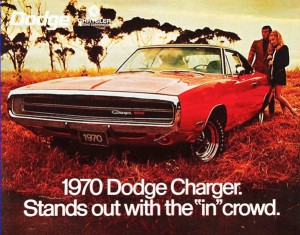1) Thomas Frank’s thesis is that businesses have changed in the way they advertise. Instead of conveying a sense of “conformity” (which was used in the past), they want consumers to feel that they can be different. This “difference” (otherwise known as counterculture) usually gives a feeling of rebelling or standing out in the crowd. In other words, businesses advertise fighting against authority and being your own person as this type of attitude has become quite popular throughout the years. As Frank states, “The anointed cultural opponents of capitalism are now capitalism ideologues”(319).
 This advertisement supports Thomas Frank’s thesis as it wants consumers to believe that the Dodge Charger will make them different. Once purchased, It will allow users to rebel against what’s currently “in” or “hip.” This “in” crowd the ad refers to is the majority of society. According to another ad for the Dodge Charger, the car defies the “in” crowd with its look as it has a “massive front,” hidden lights, and suspension among others.
This advertisement supports Thomas Frank’s thesis as it wants consumers to believe that the Dodge Charger will make them different. Once purchased, It will allow users to rebel against what’s currently “in” or “hip.” This “in” crowd the ad refers to is the majority of society. According to another ad for the Dodge Charger, the car defies the “in” crowd with its look as it has a “massive front,” hidden lights, and suspension among others.
I believe Thomas Frank is “on point” as many businesses do in fact advertise with a rebellious attitude. This still goes on today as I have seen it done on T.V, magazines, and possibly music videos. Overall, It makes me wonder what other counterculture businesses will use for their advertisements in the future.
2) In one example of neuroplasticity, Nicholas Carr discusses a study that scanned the brains of cab drivers and non-cab drivers. It was discovered that the cab drivers have a larger posterior hippocampus, an area of the brain that lets a person remember their own surroundings. After several tests, the study concluded that cab drivers with more years of experience have a bigger posterior hippocampus compared to those with less years. As a result, the anterior hippocampus was shortened in order to “accommodate the enlargement of the posterior area… [T]he shrinking of the anterior hippocampus might have reduced the cabbies’ aptitude for certain other memorization tasks” (Carr).
This result also occurs in those who constantly use the internet. Since information is always available online, it causes people to not bother remembering it. Instead, they learn how to obtain that information. Such as what websites and persons are reliable to use as a source. As for when the internet isn’t used to receive information, the chances of remembering it increases. For example, going to the library will cause our memory of the information to become stronger as it requires more action than staying at home and searching it in google. The same could apply for online schools vs regular schools. Overall, the more action done means the better the chance of remembering said information.




Man, what a sweet car! Those were the days of ignorance as bliss gas guzzling and muscle manly machines!